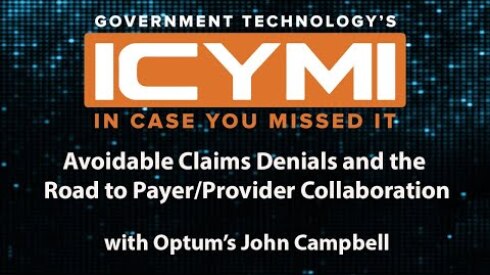GovTech Biz
-
The company, one of the few publicly traded gov tech suppliers, reports revenue growth and gains from AI and an acquisition in its latest financials. More such deals seem almost certain as Via vies for more market share.
-
The world’s biggest sporting event, set for the U.S., Canada and Mexico, is months away, and that means gov tech suppliers are preparing to make sure everyone stays safe. Drones are a main area of concern.
-
A recent blog post from Anthropic, a large AI company in the U.S., signals that the tech can help governments "modernize" legacy systems based on that old language. The stakes are high, as so much still runs on COBOL.
More Stories
-
e.Republic President and CEO Cathilea Robinett assembles a group of leading female founders in gov tech to discuss how they built their companies and to dispel any preconceived notions that women "aren't techie."
-
The company, famous for its gunshot detection system, says the new name reflects a wider view of law enforcement and public safety. SoundThinking also debuted a new platform that combines four products.
-
The company, founded by Navy Seals, markets an AI-powered gun detection platform designed for first responders. Now, via a new subsidiary, ZeroEyes hopes to gain more revenue from federal agencies.
-
Most public safety agencies cannot afford big command centers, but new technology is helping smaller agencies build decentralized versions. As Motorola kicks off its Summit 2023, Mahesh Saptharishi talks about gov tech trends.
-
Optum’s John Campbell discusses current challenges for state governments managing avoidable claim denials, the impact on Medicaid providers, and practical strategies for states to proactively improve the process.
-
Author Vidhu Shekhar explores the ways government entities can harness new AI technology, plus ideas for fostering meaningful collaboration between AI practitioners and government officials.
-
The move comes a year after the startup raised nearly $10 million in seed funding, and as first responders demand more precise incident data. The company’s CEO talks about Prepared's other new services.
-
Especially when it comes to federally funded infrastructure, public involvement is essential. But it’s no longer enough to simply host a town hall meeting — here’s how digitalization offers a better way.
-
As more state and local agencies turn to cloud computing for security, efficiency and flexibility, Polk County, Fla., offers a quick lesson about why that choice can be vital. In short, it’s about speed and transparency.
-
Versaterm CEO Warren Loomis, fresh off a new acquisition, talks about building a public safety ecosystem and why specific tools are not always enough. Versaterm is among the most active acquirers in gov tech.
-
The 12th cohort of the New York-based urban tech accelerator includes four companies with a government focus, as well as participation from a new venture capital partner.
-
An open letter calls for a six-month break on powerful AI training efforts. The idea is to develop safety and oversight systems and otherwise allow time for consideration of the tech’s rapid development.
-
Center for Digital Government senior fellows Dugan Petty and Sean McSpaden discuss the current landscape for cloud and as-a-service products, as well as best practices when it comes to procuring them.
-
As federal money flows to state and local governments, a Deloitte report points out the workforce obstacles that could slow progress. Agencies need to start creating programs to fill those gaps now, the report argues.
-
The move underscores the growth of cooperative contracting in gov tech and the spread of weapon detection technology across the U.S. Cooperative contracting is meant to speed up the traditional buying process.
-
Nationally recognized cybersecurity thought leader Dan Lohrmann joins ICYMI to discuss the potential impacts and likely outcome of current government efforts to ban the TikTok social media app.
-
Many government agencies have been slow to invest in experience the way the private sector has — but modern technology, including artificial intelligence, is opening up new avenues to reduce friction.
-
New York's Via has acquired U.K.-based Citymapper. The deal will integrate the software transit agencies use to plan routes with the tools their passengers rely on to plan trips across the world.




























